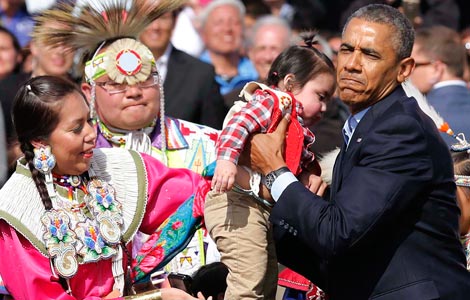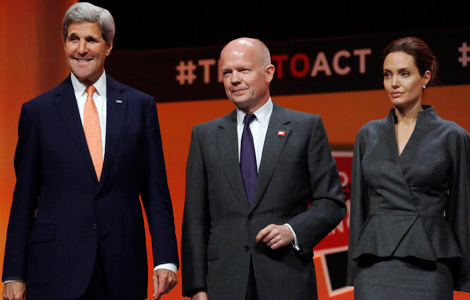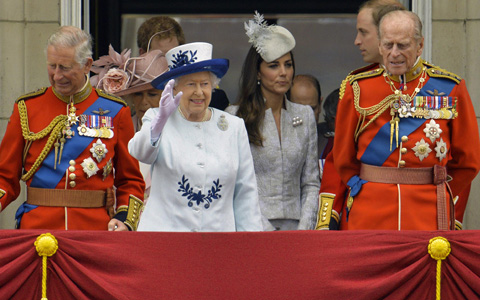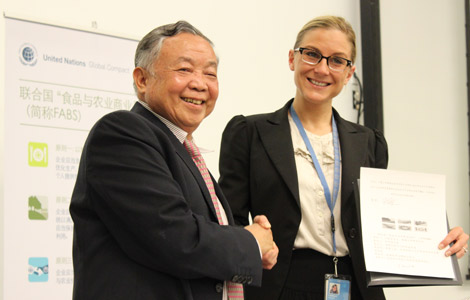Chinese calls for more cooperation among BRICS
Updated: 2014-06-14 07:38
By ZHANG FAN in Sao Paulo (China Daily USA)
|
||||||||
|
Chinese Ambassador to Brazil Li Jinzhang said recently the BRICS should conduct a more open and practical cooperation in the future with the sixth summit serve as an initiative of a new age. [Zhang Fan / China Daily] |
China is calling for more open and practical cooperation among the BRICS countries as the sixth summit meeting of the largest group of developing countries approaches, Chinese Ambassador to Brazil Li Jinzhang said.
"The sixth BRICS summit should be viewed as an important historical opportunity to initiate a new era in which the five member countries can enlarge their cooperation in core fields such as trade and investment," Li told China Daily recently in an exclusive interview in Sao Paulo.
Li made the remarks ahead of the upcoming BRICS summit to be held in Brazil next month. Presi-dents of China, Russia, India and South Africa will join Brazilian President Dilma Rousseff in Fortaleza, a northeastern city of Brazil, for the meeting.
Brazil hosted a four-member BRIC summit in April 2010, and 2014 will mark its first full BRICS summit. The 2010 summit in Brasília did not officially include South Africa, which was invited as guest in a prelude to full membership that it achieved in December 2010.
"The mechanism of the BRICS summit has achieved major developments across the years leading to member countries having closer cooperation in major regional and global issues in economy and politics," said Li. "BRICS have made significant contributions to the world's economic recovery."
However, according to Li, the 2006-established mechanism still needs to be further improved with lots of potential to be discovered.
"So we hope the five countries can establish the BRICS Development Bank and the Contingency Reserve Fund at this summit so we can promote the current cooperation and contribute more to the world economy," said Li.
At the fifth BRICS summit held in Durban, South Africa, last year, the leaders agreed to establish the BRICS Bank to provide funding for infrastructure projects. Reuters reported that the member countries will provide $50 billion to initiate the program with the share of each country still unclear.
Li said financial support plays an important role in promoting trade and investment, which are the "two wheels" for the progress of practical cooperation, and the bank will not only help to drive the two wheels for the member countries but also other developing states.
"The current international situation is still very complicated and the establishment of the bank will help developing countries to better face these challenges. Through continuous discussions and negotiations, I believe there will be a solid progress on this issue at the sixth summit," he said.
The World Trade Organization's 2013 annual report shows that the share of BRICS countries in global exports in 2012 reached 17.4 percent, an increase of 4.5 percent over 2011, and greater than North American Free Trade Agreement or the European Union (EU).
However, the report also shows that only 2.5 percent of foreign investment in the BRICS comes from the member countries, a lot less than the 40 percent going to developed countries such as the EU and the United States.
"There is a great potential for increasing the trade and investment between the member countries," said Li. "some countries focus too much on the competition but not our complementary. The current practical cooperation within the BRICS is still limited because of such doubts."
"We are from five different continents with different natural resources and advantages, we should realize that there are many opportunities for us to cooperate," he added.
Besides attending the BRICS summit, Chinese President Xi Jinping will also make China's first state visit to Brazil in four years.
As two of the largest developing countries in the world, China and Brazil's bilateral trade has in-creased sharply in the last few years, reaching $90 billion in 2013 compared with only $17.4 mil-lion in 1974. China's investment in Brazil increased to more than $20 billion in 2013 from $200 million in 2009.
"Such sharp increases show that there is a necessity for the two countries to advance their ties in investment and trade," said Li.
"There are indeed some commercial conflicts in this process, but I believe these disputes will not play a main role in the general trade between China and Brazil. Such competition brings not only finance, technology and experience, but also create jobs and contribute taxes for Brazil, so the ad-vantages are obvious," he added.
fanzhang@chinadailyusa.com
- BRICS Development Bank set to become a reality
- Chinese envoy says BRICS can regain rapid growth
- BRICS countries to enhance scientific co-op
- China tops Times rankings of universities in BRICS
- BRICS pledge cooperation on climate change
- BRICS likely to make progress on bloc bank at summit
- China to contribute $41 billion to BRICS fund

 Tender moments of world leaders with their children
Tender moments of world leaders with their children
 Chinese fleet joins others for RIMPAC exercise
Chinese fleet joins others for RIMPAC exercise
 Obama visits native American reservation
Obama visits native American reservation
 Clinton has reasons to run at her ready
Clinton has reasons to run at her ready
 Angelina Jolie shines at summit against sexual violence
Angelina Jolie shines at summit against sexual violence
 Railroad photo shows Asian-Americans
Railroad photo shows Asian-Americans
 Britain celebrates Queen's official birthday
Britain celebrates Queen's official birthday
 Across Americas
Across Americas
Most Viewed
Editor's Picks

|

|

|

|

|

|
Today's Top News
Former US congressman: Diaoyu belongs to China
US options could help combat advances by Iraqi militants
US applauds voting in Afghan presidential polls
Oregon high school shooter's parents offer apology
Army: Bergdahl 'looked good' after returning to US
Envoy rebuts Vietnam, Philippines on sea issue
Cui: China poses no threat to US
Japanese F-15 tails Chinese jet at close distance
US Weekly

|

|







